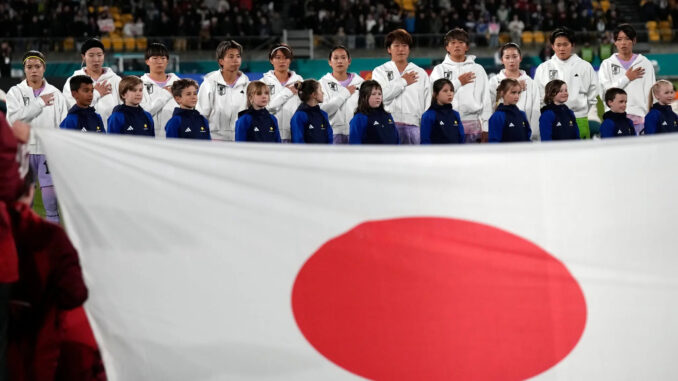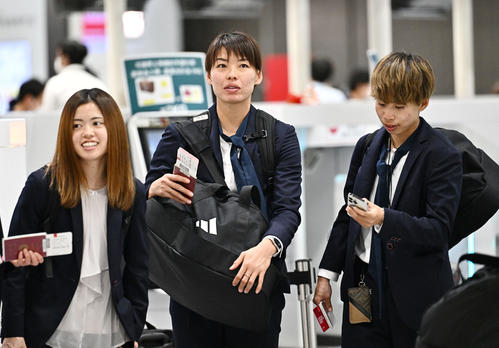
After Japan were drawn to play DPR Korea in the final qualifier for the Paris 2024 Olympic Games, much intrigue existed as to whether the first leg would in fact take place in Pyongyang, which had not hosted any international match since the advent of COVID-19 in early 2020.
Amidst a period of political tension, no flights are currently running between the two countries and the decision was made by the organisers to host the DPRK’s home fixture in a third-party country, with China believed to be the most logical and likely option.
The Japan Football Association’s chairman of women’s football, Norio Sasaki, fist announced the decision to move the fixture away from DPRK shores during Nadeshiko Japan’s public squad announcement on 8 February.
At that time an alternative location had not been decided and Dalian, China was being touted as a likely option in media circles.
However, in a stark turn of events the first leg of the tie has now been relocated to Jeddah in Saudi Arabia, on the other side of the vast continent, by order of the Asian Football Confederation.
Relocating home fixtures is not uncommon for the DPRK and their next-door neighbours are usually the ones to play host.
Whilst keeping the game within the cold weather climate of East Asia is seemingly the common-sense option, the eventual decision of Jeddah is somewhat bewildering.
On 14 February, Sasaki confirmed to a selection of local reporters that preparations were being altered to cater for the encounter to be held in the winter heat of Saudi Arabia, where temperatures still hit 30-degrees-plus during daylight hours.
At the time of writing there has been no official announcement from either FA, nor the AFC, regarding the venue change.
Player conditioning is at the forefront of Japan’s concerns whose gameplan revolves around high-tempo and fluid movement. Enduring such a short adaptation process to the weather conditions, along with the strenuous long-haul travel, will surely only serve to impact Japan’s preparations negatively.
More interestingly, however, are the reports that the DPRK moved their training camp to southern Russia some days ago. Japan, meanwhile, were only informed of the Middle East relocation just four days prior to the game.
The details on the ground suggest the DPRK understood the eventuality ahead of time and subsequently took strategic steps that would lead to a sporting advantage over their opponents.

An argument can be made that the benefits and drawbacks suffered by both sides even themselves out. Indeed, the DPRK may have had advanced notice but the weather conditions in a Russian training camp are unlikely to hold much, if any, advantage over Chiba, Japan.
Whilst the absurd travel requirements fly in the face of player safety and a “players first” approach, Japan is a squad well accustomed to such necessities with members based in major leagues right across the globe. Conversely, the DPRK have done little travel in recent years given their four-year period of inactivity across the pandemic.
But the wider question at hand does not consider this event in isolation.
The AFC has been less than transparent in clarifying the reasons behind this last-minute relocation to drastically different playing conditions. Without full and proper reasoning from the organisers one would be forgiven for assuming that either unsavoury motives are at play, or a lapse in the system has allowed for an unfair sporting advantage.
With the game being taken away from DPR Korea, it is fathomable that DPRK FA would have had some input into the selection of the alternative venue. Some reports suggest that they made a swift decision on the Middle East internally, but stalled on returning their official answer to the organisers. Meanwhile, they would make the necessary preparations for Saudi Arabia with their opponents left in the dark.
Nevertheless, the cards have been dealt and Nadeshiko boss Futoshi Ikeda insists his side will do the talking on the pitch:
“Rather than waste your energy getting angry, use it on the pitch,” he said upon their departure to Saudi Arabia, which had to be made on separate flights just to get the team to Saudi Arabia in the shortest time possible.
Without doubt the sporting integrity of the organising body has been thrust into the spotlight.
Upon conclusion of this fixture serious questions need to be raised as to how this decision came to be, along with full transparency on what exactly the due process is for fixture relocations as this, sentiments also expressed by Japan captain, Saki Kumagai.
“Honestly, I don’t think something like this should happen,” she said, “and while it’s the players’ job to prepare for the match, the organizers definitely have a responsibility to make sure they’re in their best condition.
“So, I don’t think something like this should happen in the future. Well, I don’t think it should happen this time either, but I think it’s important that we do what we can for the future.”




